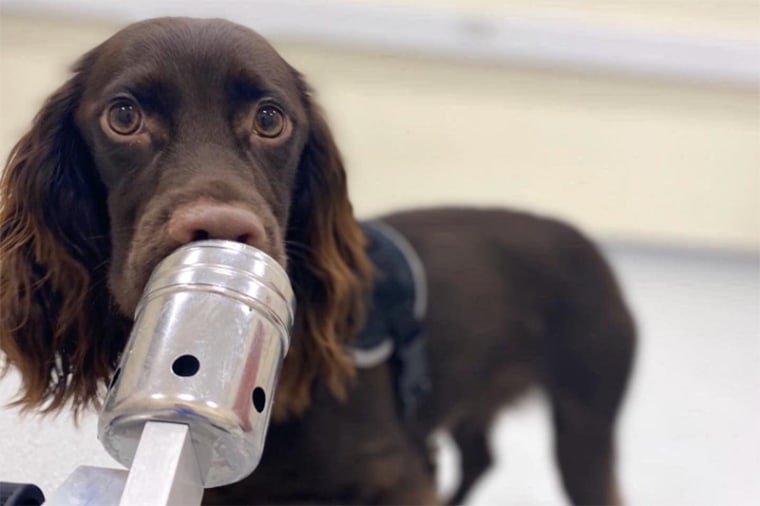Canine-Human Diagnosis and Comfort
"[The findings provide] deeper knowledge of the human-dog relationship and adds to our understanding of how dogs perceive and interact with human psychological states.""[Earlier research with the use of sniffer dogs and human biological samples involved mostly detecting illness]; they can smell other parts of the human experience [however].""[The study results] provide firm evidence that odour is also a component that dogs can pick up on."Clara Wilson, study author, doctoral student, school of psychology, Queen's University Belfast"I think this work helps confirm that dogs can be savvy in reading our emotional states, and this study in particular shows that this could be done through scent cues.""The results seem to reinforce what a lot of owners feel; that their dog can be quite sensitive to their emotional state."Nathaniel Hall, director, Canine Olfaction Research and Education Laboratory, Texas Tech University
 |
| The dogs, including Minnie, were presented with samples from 36 people who gave sweat and breath samples before and after doing a fast-paced arithmetic task. Courtesy Queen’s University Belfast |
"Spes ignored everyone else and immediately went to the crying young woman to see her.""She loves people, so it was not surprising but in this case it was clear that this woman was the only person she wanted to see."Victoria Allen, Goochland, Virginia, dog owner
The experience was recounted by Victoria Allan of her dog Spes when they were at a beach, and she and Spes came upon a scene of a group of young people. One of the group was a young woman who was obviously upset and weeping. Her dog responded to the presence of an upset woman by directly approaching her. It seemed that the dog was sensitive to the woman's distress, meaning to comfort her. The study cited a number of such conclusion-affirmative occurrences interpreted by the dog owners as proof of a dog's sensitivity to people's state of mind.
Such anecdotal stories are common to many, if not most, people with companion dogs. That in their close personal experience with their dogs it became obvious to them that their dogs were aware of and sensitive to the state of mind of their owners. Particularly when something might happen to upset their emotional equilibrium. Of course, tone of voice in addressing a dog, body language that the dog assesses, informs a dog when he's being reproached.
The study in question, however, appears to affirm that dogs' intensely deep and discriminating sense of smell may be their primary tool for assessing emotional state of mind in humans. It is well enough known that dogs' exceptional sense of small has turned them into working dogs, trained to sniff out any number of things, from the presence of contraband drugs or ammunition, and of course, the scent of infections from chronic diseases before medical science itself can detect them.
Changes in the odour of breath or perspiration can guide dogs to detect with a high degree of accuracy chemical odours exuded by people when they feel under psychological, emotional stress. A growing body of research expresses evidence related to dog behaviour; how dogs view things, react, and use their extraordinary olfactory sense in interacting with people. Their ability to produce relief for people suffering anxiety attacks and symptoms of depression are well known. Leading to their use as buffers against emotional upsets.
Dogs giving attention to individuals and situations are known to assess such details as signals people send reflecting their moods; body language, type of voice changes, or quality of breathing, all symptoms weighed by dogs striving to make sense of what they see, hear and smell, with their hyper-acute senses. While the study focused on the acuity of a dog's sense of smell, it made no attempt to determine whether dogs could identify human emotions; recognize whether people were feeling happy, sad, angry or fearful. Only that stress was being experienced as could be measured by increasing heart rate and blood pressure.
 |
"The dogs can differentiate something about human odours in stressed vs non-stressed states, but not necessarily that they know anything about how a person is feeling, or what it means when the humans are stressed.""They might -- but we just don't know that from this study."Evan MacLean, director, Arizona Canine Cognition Center, University of Arizona
Labels: Canine Senses, Canine-Human Symbiosis, Comfort, Diagnosis, Research

0 Comments:
Post a Comment
<< Home